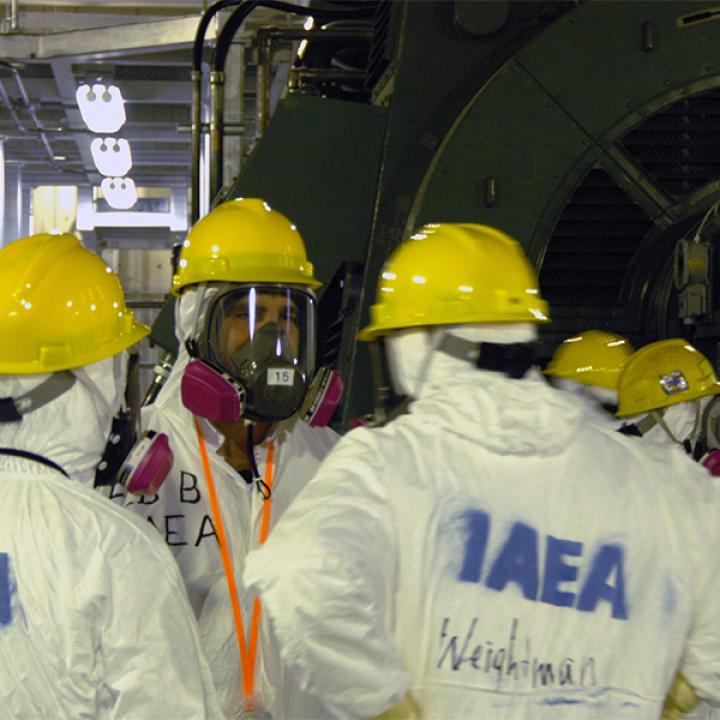
- Policy Analysis
- Articles & Op-Eds
The First Strict Implementation Test of the Iran Nuclear Deal

The latest meeting of the IAEA board of governors is an opportunity to bolster the investigative and disclosure mechanisms needed to deter Iran and other potential proliferators.
A recent International Atomic Energy Agency report confirmed what the U.S. and its allies have long maintained: that, contrary to its denials, Iran had an organized nuclear weapons program until 2003 and continued elements of this work through at least 2009. This revelation was not unexpected; Western officials have long accused Iran of seeking nuclear weapons. The Obama administration and its allies intend to move ahead with implementation of the deal on Iran's nuclear program, having pledged in the agreement that Iran did not have to disclose its past nuclear weapons' work or fully cooperate with the IAEA investigation to receive sanctions relief.
The allies refrained from demanding that Iran come clean on its nuclear efforts for the same reason that they accepted only partial and temporary constraints on Tehran's current nuclear activities: They hoped that defusing tensions on this issue and focusing on the future, rather than the past, would build confidence in Iran's nuclear intentions so that a more stable and cooperative relationship prevails between Iran and the West as we move toward expiration of the deal in 15 years. But Tehran's grudging cooperation with the IAEA and its repeated flouting of the United Nations' ban on missile test launches are ominous signs that even faithful implementation of the deal by all sides may not succeed in building that confidence. By protecting its nuclear secrets, accepting only temporary constraints on fuel-cycle work, and advancing its missile program, Iran is keeping its nuclear options open for the future. In response, the international community must keep in place the tools to challenge Iran should its pursuit of nuclear weapons resume.
The Dec. 15 meeting of the IAEA board of governors provides an opportunity to do just this. The board should endorse the IAEA's finding that Iran had pursued nuclear weapons and underline that Iran's incomplete cooperation with the IAEA's investigation, though perhaps sufficient to satisfy the minimal requirements of the nuclear deal, stymied the agency's work. Rather than closing the investigation as Iran has demanded, the board should direct that it continue.
The nuclear deal provides tools for the IAEA to carry out such an investigation above and beyond those provided by the Non-Proliferation Treaty and its additional protocol. These tools are not as strong as they could be, but they nonetheless should be utilized to their fullest. The IAEA needs financial and human capital resources for this work, especially from the United States, Britain, and France, which have expertise on nuclear weapons. Those countries can also work together to provide intelligence and expertise to assist the IAEA.
If the IAEA board does not close the investigation, Iran may threaten to delay implementation of its obligations under the nuclear agreement. Should that happen, the U.S. and its allies should make clear their readiness to withhold sanctions relief until Iran proceeds with implementation -- stressing that continuing the investigation is not inconsistent with the nuclear agreement but in line with Iran having forsworn such activities as part of the deal. If Russia, China, or other members of the IAEA's board of governors object, the U.S., France, Britain and like-minded allies should not hesitate to use their majority on the board to force the matter.
Iran has refused to take either of the two steps that could provide real assurance that it has forsaken its desire for nuclear weapons: abandoning uranium enrichment altogether and cooperating with the IAEA's investigation by providing a full disclosure of past nuclear activities and the access required to verify its completeness. Continuing to insist on a complete investigation into Iran's nuclear weapons activities is the first test of international determination to strictly implement the nuclear deal. Failing this test would signal to Tehran that the West will allow it to dictate the terms under which the agreement is implemented in the coming years. It would also undermine the credibility of international non-proliferation mechanisms, encouraging other would-be nuclear powers that they can escape scrutiny. If these mechanisms are to succeed in deterring Iran and others in the future, their integrity must be zealously guarded.
Michael Singh is managing director of The Washington Institute. Simond de Galbert is a French diplomat on detail as a visiting fellow at the Center for Strategic and International Studies.
Wall Street Journal


